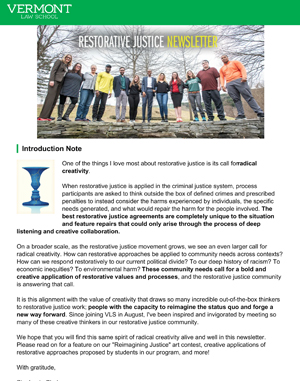Environmental Advocacy Clinic Files Brief in D.C. Circuit and Filing with Federal Regulators to Support State Water Quality Requirements
Vermont Law and Graduate School’s Environmental Advocacy Clinic (EAC), on behalf of American Whitewater, Vermont Natural Resources Council and Vermont Council of Trout Unlimited, has filed an amicus brief with the U.S. Court of Appeals for the District of Columbia Circuit (D.C. Circuit) urging the court to uphold the State of Vermont’s strong water quality conditions for the federal relicensing of several hydroelectric dams in Vermont’s Lamoille River Basin. These conditions are contained in a water quality certification issued by the Vermont Agency of Natural Resources in 2016, and the dams’ owner, the Village of Morrisville (Morrisville), is seeking a court ruling that would void the certification.
Also this week, EAC filed comments with federal regulators at the Federal Energy Regulatory Commission objecting to Morrisville’s proposal to separate its license and avoid complying with the certification at its Green River development.
“It is well past time for these hydropower dams to comply with the Clean Water Act and Vermont water quality standards, an outcome our clients have been pursuing for years,” Professor Christophe Courchesne, director of the Environmental Advocacy Clinic, said. “Vermonters cherish their beautiful and ecologically important rivers, and we are asking the court to uphold the state’s authority to protect them — authority that is crucial to our wildlife, recreationists and resilience to climate change.”
Situated along the Lamoille and Green Rivers in north-central Vermont, Morrisville’s four hydroelectric dams currently operate under a 1981 federal license with weak and outdated water quality conditions, and the dams are altering the stability and flow of the rivers, degrading water quality, obstructing fish nurseries, disrupting wildlife habitat and adversely affecting recreational opportunities for Vermont anglers and boaters. The Lamoille River flows into Lake Champlain, which has experienced severe water quality challenges in recent years.
Under Section 401 of the Clean Water Act, states have the authority to impose environmental conditions on hydropower licenses. In 2016, the Vermont Agency of Natural Resources issued a water quality certification for the dams’ federal relicensing with conditions intended to address the harms that the dams were causing water resources. Morrisville appealed the certification up to the Vermont Supreme Court, which rejected Morrisville’s objections in 2019.
Morrisville later sought a ruling from the Federal Energy Regulatory Commission that Vermont had waived its authority because Morrisville initially applied for the certification in 2013 and the state was obligated to act on the application within one year, the deadline set by the Clean Water Act. The Commission disagreed because Morrisville itself had withdrawn and resubmitted its application, and Vermont’s 2016 certification was therefore timely. Morrisville then filed an appeal of that decision, now pending before the D.C. Circuit in Village of Morrisville, Vermont v. Federal Energy Regulatory Commission, D.C. Cir. No. 21-1042.
The groups’ brief argues that Vermont never waived its authority and a contrary ruling would pose significant consequences for states, the public and the environment. The brief emphasizes the negative impacts of aging hydroelectric dams like Morrisville’s on ecosystems and recreational uses like fishing and boating, underscoring the need for strong state water quality conditions.
The groups’ separate comments to the Federal Energy Regulatory Commission oppose Morrisville’s proposal to separate its license, filed in 2022, which would lay the groundwork for Morrisville to avoid ever complying with the state’s water quality certification at the Green River development. Those comments followed a series of prior filings, drafted by student attorneys at the clinic on behalf of the groups over the last two years, seeking Morrisville’s immediate implementation of the certification at all of its dams.
EAC student attorneys Alexis McCullough, Lydia Samson, Taylor Scott Berkley, Ashton Danneels and Willow Hogan authored the brief with Environmental Advocacy Clinic Director Christophe Courchesne and Assistant Professor Diana Csank. Willow Hogan authored the comments with Director Courchesne.
###
American Whitewater is a national conservation nonprofit focused on protecting America’s whitewater resource and enhancing their safe enjoyment.
Vermont Natural Resources Council is dedicated to protecting and enhancing Vermont’s natural environments, communities, character, and unique sense of place.
Vermont Council of Trout Unlimited is committed to protecting and preserving cold-water fisheries and watersheds throughout Vermont for the benefit of angers and the public.
About Vermont Law and Graduate School:
Vermont Law and Graduate School, a private, independent institution, is home to a law school that offers ABA-accredited residential and online hybrid JD programs and a graduate school that offers master’s degrees and certificates in multiple disciplines, including programs offered by the Maverick Lloyd School for the Environment, the Center for Justice Reform and other graduate-level programs emphasizing the intersection of environmental justice, social justice and public policy. Both the law and graduate schools strongly feature experiential clinical and field work learning. For more information, visit vermontlaw.edu, Facebook and Instagram.


















